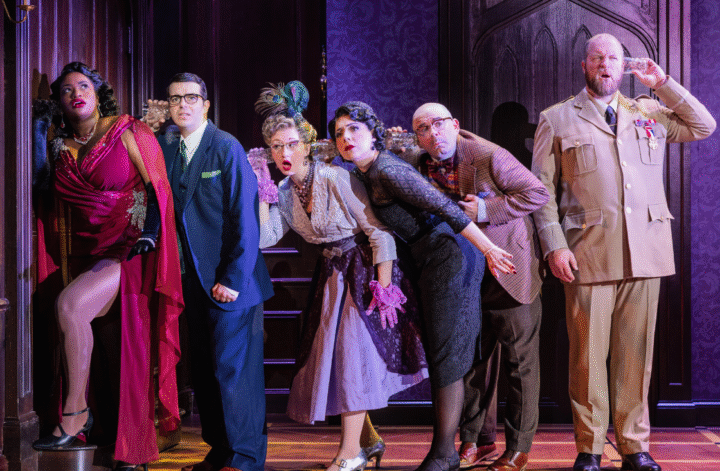From the moment we walk in to Palm Beach Dramaworks’ current production of Camping with Henry and Tom, we are ushered into the world of the play through Bert Scott’s stunningly detailed forest set. If not for a screen against the back wall of the stage, onto which are projected images and video designed by Adam J Thompson that further set the scene with period appropriate imagery, one could almost be fooled into thinking they were still outside!
As music appropriate to the play’s 1920s time period plays, the piece starts off with a bang with two more visual reveals, one of them involving that screen and the other, which I won’t spoil the specifics of, kicking the action of the play into gear.
On the surface, that action seems to follow from a relatively simple premise.Three men, enjoying each other’s company and the great outdoors on a camping trip, find themselves with no way back out of the woods after mother nature interferes with the functioning of their automobile.
The thing is, these three men aren’t just any Tom, Dick, or Henries— two of them are respected businessmen whose innovations changed the face of America, and one of them is its then president.

To refresh your memory, that would be Warren G. Harding, who was one of the most popular sitting presidents during his time in office but whose legacy was so tarnished afterwards by the revelation of scandal after scandal that he is now remembered as one of the worst.
According to an author’s note found in the program, one of playwright Mark St. Germain’s main inspirations for this piece was the fact that the highest office in the land is one that Harding never wanted to hold at all, seeming instead to have stumbled into the role by happenstance.
This makes for a palatable tension between him and one of the other three campers—a man who Germain notes undoubtedly did. That would be Henry Ford, most known for revolutionizing the automobile industry with the introduction of the Model T Ford. Tasked with keeping the uneasy peace between the two is none other than Thomas Edison, who has grown in his old age into an acerbic grump but lost none of his piercing intelligence.
And while the genuinely witty wisecracks that fly between the three make this camping trip a pretty entertaining one, its most memorable moments manage to be downright chilling. Though the implied parallels between the politics of 1920s and the 2020s are, for much of the play, just another source of humor—as in the case of references to a few of Harding’s extramarital affairs—a revelations about one of the men’s vicious bigoted beliefs was a terrifying reminder of what playing politics can conceal.
Director William Hayes does an admirable job of keeping the proceedings from going stale despite the relatively low-key plot, eliciting impressive performances from an assembled cast of seasoned pros. Since I found it impossible to choose a standout among the three main players, I’ll instead commend each individually for creating three fleshed-out feeling characters from the historical figureheads.
Rob Donohoe probably earns the most laughs as self-assured misanthrope Edison, while John Leonard Thompson gets the showiest role as ambitious egomaniac Ford. Then there’s Tom Wahl, who nails Harding’s natural likability and whose portrayal is a perfect match for Germain’s conception of the character as someone who you’d love to have as a next-door neighbor but who you’d hesitate to leave in charge of your country!
Collectively, I would also say that the work of the performers and technicians outshines the actual script of Camping with Henry and Tom, which in a way feels constrained by Germain’s choice of concept and the inescapable strictures of history.
Since we know, for instance, that Henry Ford did not become president, his plot to ascend to the position is robbed of most of its suspense. And that the bulk of the play is focused on abstractions and hypotheticals robs it of most of its moment-to-moment stakes.




